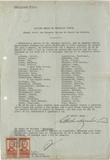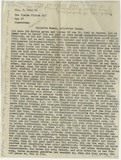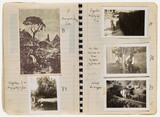Ulrich Becher: Brasilianischer Romanzero {Brazilian Romanzero], 1950
Ulrich Becher: Brasilianischer Romanzero {Brazilian Romanzero], 1950
Western civilisation [...], technocratic civilisation, which has imposed countless taboos and fallen prey to the black magic of the hydrogen bomb, has, in the anything but modest opinion of this romance writer, no grounds whatsoever to look down on believers in Macumba. It is known that Macumba can give one individual tremendous magical power over an entire group, at times making them arbiters of life and death.
But we have experienced this already. (ed. trans.)
Ulrich Becher in the epilogue to Brasilianischer Romanzero [Brazilian Romanzero], 1962
Ulrich Becher uses the ballad-like style of the Iberian genre of romance as a vehicle for a humorous, opinionated collection of impressions that he formed while in exile in Brazil between 1941 and 1944. In doing so, he succeeds in creating an impressive portrayal of the country’s sometimes overwhelming strangeness. Its wild vegetation, extreme climatic conditions and cultural idiosyncrasies find their way into his lyrics through his use of Brazilian expressions. However, Becher also succeeds in looking behind the façade of this seeming “exoticism” and drawing attention to the social ills that characterised Brazil in the 1940s. He does this by using the metaphorical device of the rabid stray dogs which, together with their persecution, are the subject of the Romanzero and become a symbol of social inequality. Along with this accurate portrayal of social conditions, Becher was also interested in the secret Afro-Brazilian cult of “Macumba”, which he engages with in his plays Samba and Der Herr kommt aus Bahia (The Man Comes from Bahia, later known simply as Macumba).
The first edition, published in 1950 by Werner Classen Verlag in Zurich, is illustrated with numerous woodcuts by artist Axl von Leskoschek, who was a friend of Becher’s; he was also the inspiration for Albert Trebla, the main protagonist in Murmeljagd (The Woodchuck Hunt).
Along with the text, this manuscript page features caricatures of each of the characters in the Romanzero; it is characteristic of Becher’s work that his literary output was frequently enhanced by his artistic skills.

![Manuscript: Ulrich Becher, Brasilianischer Romanzero [Brazilian Romanzero] Manuscript: Ulrich Becher, Brasilianischer Romanzero [Brazilian Romanzero]](/KIE/Content/EN/SpecialExhibitions/UlrichBecher-en/Images/Objects/romanzero.jpg?__blob=normal&v=3)




![Title page: Ulrich Becher, Das Märchen vom Räuber, der Schutzmann wurde [The Tale of the Robber Who Became a Policeman] Title page: Ulrich Becher, Das Märchen vom Räuber, der Schutzmann wurde [The Tale of the Robber Who Became a Policeman]](/KIE/Content/EN/SpecialExhibitions/UlrichBecher-en/Images/Objects/raeuber.jpg?__blob=thumbnail&v=3)